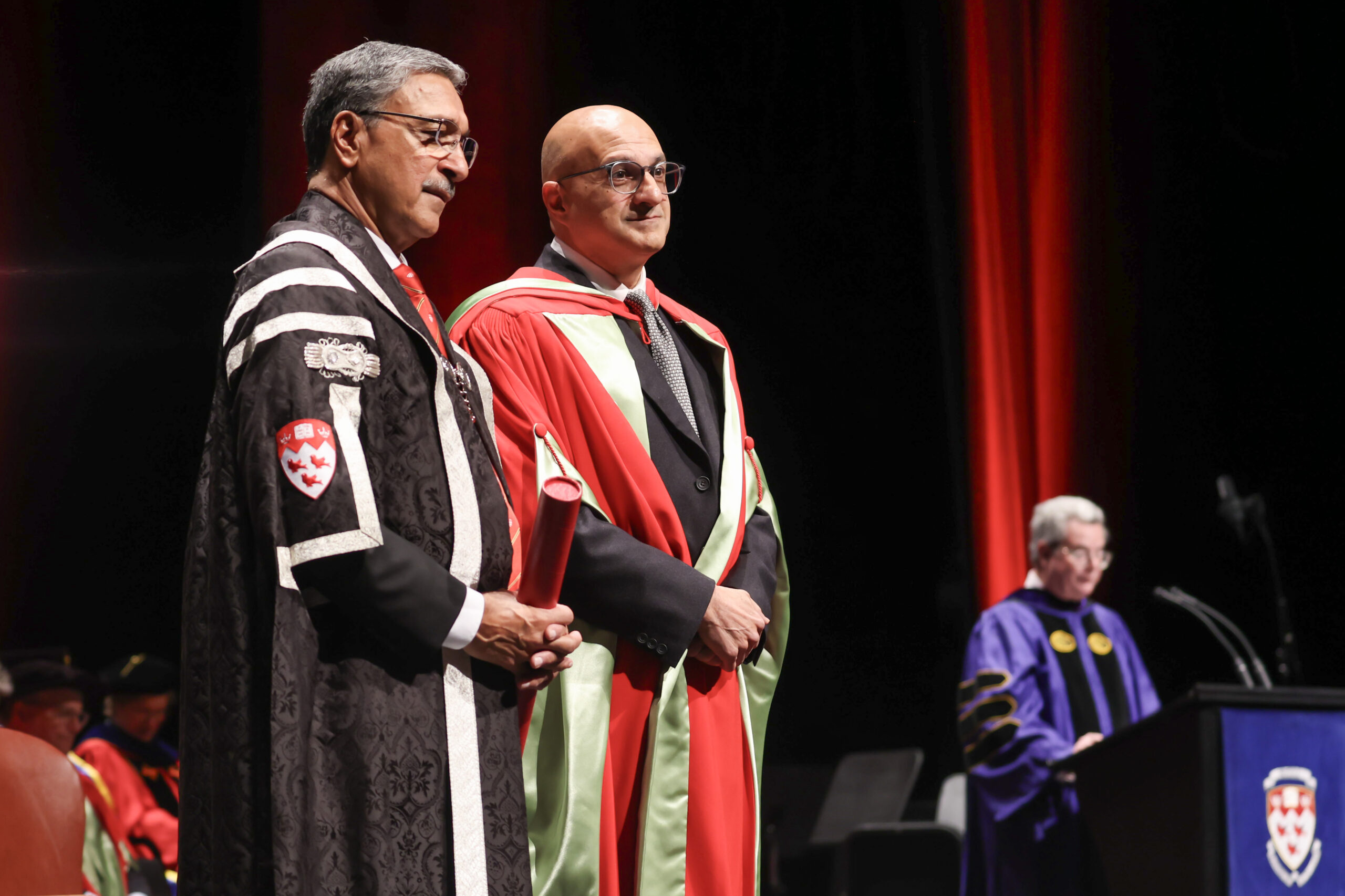
Students coming from high school often arrive with specific – and mistaken – expectations of the mathematics classroom. In Rustum Choksi’s courses he emphasizes a pedagogical paradigm shift, whereby mathematics is not about memorization nor symbolic manipulations and calculations but rather a beautiful and diverse discipline which is often a means to understanding our complex world.
“The more you give to mathematics, the more it gives back,” says Choksi, recipient of the Principal’s Prize for Excellence in Teaching in the Full Professor category at the fall convocation ceremonies on November 20. “Mathematics is about building your ability to think rigorously and rationally by studying basic structures and quantities, how these quantities change, their interdependencies, and how one can best estimate them,” he says.
“The study of math is a continuum,” says Choksi, a professor in the Department of Mathematics and Statistics. “For example, one can explore and connect fundamental algebraic and geometric structures from a purely mathematical point of view; one can apply deep ideas in probability to gain insights about the training of deep neural networks; one can use our understanding of partial differential equations to derive state of the art computational tools for addressing and modelling fluids and complex materials. This is something I love about mathematics, and something which should be celebrated in our classes.”
Developing insight and wisdom
His approach can be a departure from the traditional math classroom, which has historically relied on what Choksi refers to as the “monkey-see, monkey-do paradigm,’’ with students passively gaining exposure to material by seeing examples and solutions, and then following patterns to tackle assignments and exams.
“This was perhaps partially justified years back,” he says. “But in my 25-plus years of teaching, access to computers has changed the game. When I began teaching, I would give some credit for evaluating a simple single or double integral. Now, in my Advanced Calculus for Engineers course, I tell them that for homework, I don’t care how they get the numerical answer for the integral; instead, the focus lies in what the integral means and how it relates to a concrete physical and/or geometric problem.”
“More simply, how does it relate to things we see every day? So, the emphasis is developing the insight and wisdom to set up the appropriate integral for the desired problem and putting it in a form that enables standard software to give the actual numerical answer.”
Students up for the challenge
In addition to calculus for engineers, Choksi regularly teaches Honours Analysis and Honours Partial Differential Equations. The latter is a course for both math and physics students. He is effusive about the experience. “I know everybody says this when they get a teaching award, but here it’s simply the truth: what I’m able to do in classrooms at McGill is due to the phenomenal quality of our students,” he stresses.
Choksi joined McGill thirteen years ago and says that “coming to McGill made a huge change in my teaching, because – wow! – I can challenge students and they will respond.”
Their willingness to engage with Choksi’s challenges prompted him to write a 600-page text, Partial Differential Equations: A First Course. “I wouldn’t have done this elsewhere, but I felt that McGill students deserved it and would benefit from it,” he says.
Undergraduate research opportunities
Choksi’s interest in engaging his students isn’t confined to the classroom. “I want students to realize that mathematics is a thriving research field,” he explains.
To bring students into the world of research, Choksi’s summer activities regularly involve projects utilizing the skills, enthusiasm, and synergy of undergraduate research assistants. “Undergrads are often the best people to see ideas come to fruition. My best work on variational approaches to image processing stems from work with two outstanding undergrads and that experience steered my research in a completely new direction.”
In addition, he notes, “Working with students is fun as well as rewarding and many of my colleagues have had similar success. We could not be doing this without our Faculty of Science’s unwavering commitment to undergraduate research. In this respect, I strongly believe we are peerless amongst Canadian universities.”
Training for the brain
Teaching, like mathematics itself, gives back what you invest in it. “If you look at teaching as a chore, you’re not putting the right effort and focus into it,” he says. “You won’t enjoy it if you’re regurgitating a textbook. But if you see it as a way of training the human brain to think in a broader and more rational way, you’ll get so much back from it.”
This year Choksi was named Chair of the rather large Department of Mathematics and Statistics, and with new and weighty administrative duties, he is faced with a year outside of the classroom. But this is only temporary, he insists. “I’m trying to figure out how to teach next year,” he says. “Otherwise, I might go bonkers.”
Rustum Choksi: Winner, Principal's Prize for Excellence in Teaching ... - McGill Reporter
Read More
Tidak ada komentar:
Posting Komentar